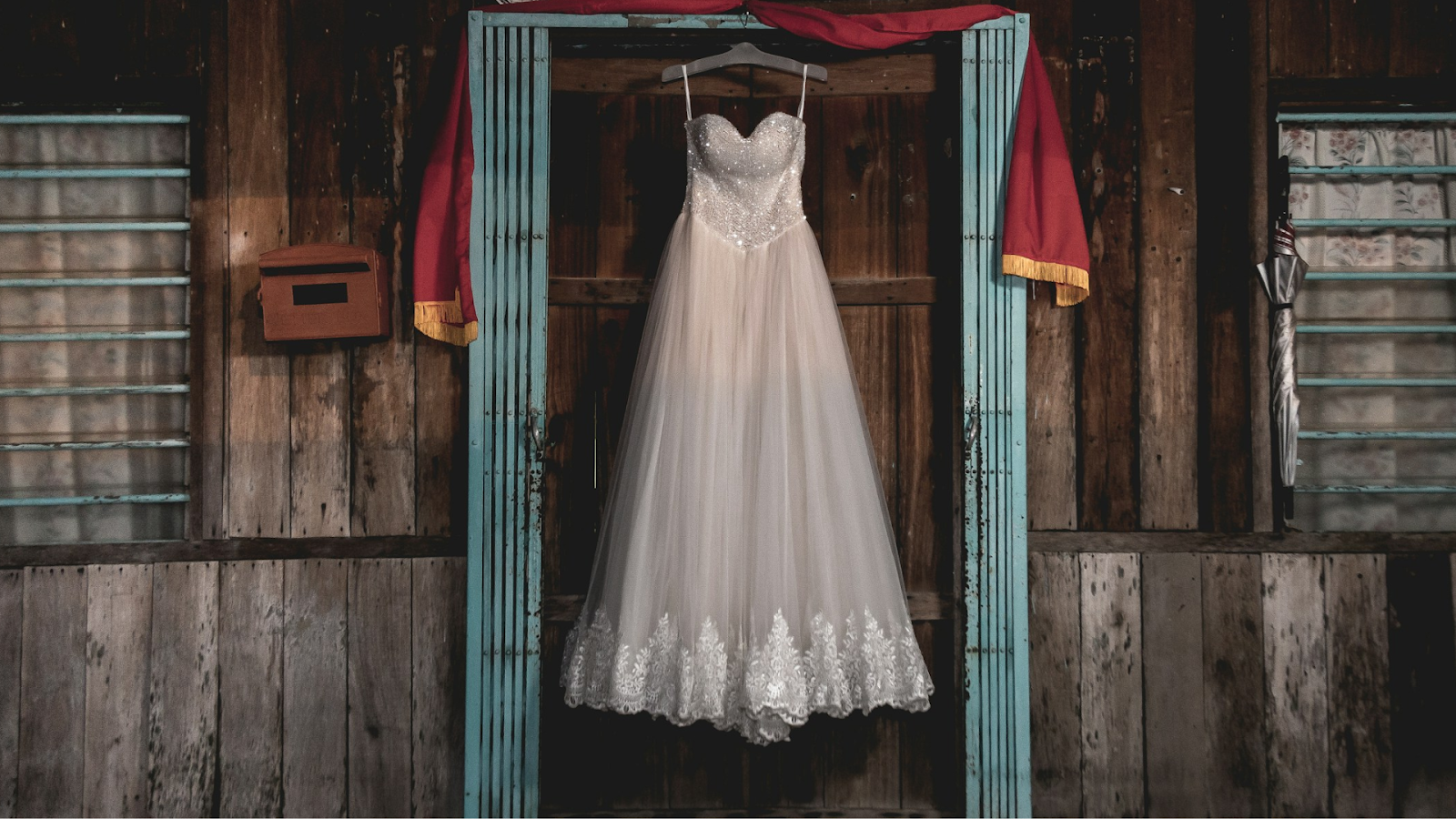SUMMARY:
-
Wedding dress preservation is important as it helps to remove the stains, prevents yellowing, and keeps the gown in the best condition for years to come.
-
Acting quickly after the wedding is important since delaying preservation can make it harder to restore the dress to its original beauty.
-
Brides should understand all costs upfront and ask about extra charges for accessories, repairs, or special stain treatments.
-
Many specialists offer guarantees against yellowing or deterioration, but it’s important to check what the guarantee actually covers.
-
Different preservation kits are available depending on the gown’s age, value, and condition. Brides can even order kits before the wedding for faster preservation afterward.
Even though the wedding dress preservation techniques have been around for over 100 years, many brides still find themselves confused about whether they should preserve their gowns or not.
It’s surprising that despite the popularity, people on social media discuss whether it’s really necessary or worth the effort.
For instance, a user of Quora asked: What advice would you give to someone considering whether or not to preserve their wedding dress?
The hesitation is totally understandable, but the truth is, preservation is definitely the best option. It helps remove all stubborn stains, protects the gown from yellowing, and preserves it well for future generations.
But sometimes, waiting too long to preserve a gown can make it harder or even impossible to bring it back to its original condition. And that’s why acting quickly is the best option.
But to clear all your doubts and make you feel confident about the decision, we have brought a detailed wedding dress preservation checklist to help you take the best care of your gown.
So, without a wait, let’s start!
1. Choose a Reputable Preservation Specialist
One of the most common concerns new brides have is who to choose for the preservation services. As mentioned by the following Quora user, it’s always best to go to a reputable preservation expert who truly understands the delicate nature of your wedding gowns.

Also, when going for preservation, avoid regular dry cleaners. Many of them use plastic bags and standard cleaning methods that aren’t safe for wedding dresses and can cause long-term damage to the fabric.
2. Gather Details About the Services They Offer
The next important thing you need to ask is the range of services they provide to ensure that your gown and accessories are well cared for. Most reputable preservation experts offer a variety of kits according to the age, fabric, and price of the gown.
These kits come with acid-free/neutral boxing, UV-protection, and anti-yellowing guarantees.
In addition to the gown, the preservation services usually cover other important accessories like veils, gloves, and others. Many specialists also offer minor repairs and stain treatments as part of their service.
So, it’s important to ask them in detail about the different services they offer.
3. Consider the Cost Transparency
Most preservation specialists are usually clear about their pricing, but it’s important to ask about any additional fees that might apply.
For example, cleaning or preserving accessories like veils, gloves, and slips can sometimes come with extra charges.
Also, some minor repairs or special stain treatments could affect the total cost. So, it’s always a good idea to request a detailed breakdown of services and fees before committing.
4. Ask About the Cleaning Methods
The wedding gowns are often made from delicate fabrics like silk, lace, and tulle, and they should always be cleaned using gentle and safe materials. Harsh chemicals or aggressive cleaning can cause damage, discoloration, or weakening of the fabric over time.
A trusted preservation expert will use the specialized and fabric-safe cleaning techniques that are specifically designed for wedding dresses.
So, it’s a good idea to inquire about their cleaning methods, especially if you have any sensitivities or concerns about chemicals.
5. Don’t Forget ‘Guarantees’
Many preservation companies promise to give protection against yellowing and deterioration. Such guarantees show confidence in their cleaning methods, materials, and storage techniques.
It’s important to understand what exactly the guarantee covers, whether it’s protection from yellowing, stains, or fabric weakening.
Be sure to ask about the terms and how the dress should be stored to keep the guarantee valid.
6. Ask About Tracking Details
When sending your wedding dress off for preservation, it’s important to ask if the specialist provides tracking details for your package.
Since your gown is a priceless keepsake, knowing where it is throughout the cleaning and preservation process can give you much-needed peace of mind.
Also, this helps reduce any worries about loss or damage during transit and ensures clear communication throughout the entire process.
7. Know About Refund & Return Policy
Before finalizing your wedding dress preservation service, it’s important to understand the company’s refund and return policy. This information ensures that you know your options in case you’re not satisfied with the service or if any issues arise during the process.
Also, knowing the return policy helps you understand the expected timeline for getting your dress back, how it will be shipped, and what to do if the gown arrives damaged or not in the promised condition.
8. Choose the Appropriate Kit
Different wedding dress preservation kits come with varying specifications, so it’s important to choose the one that best matches your dress’s age, value, and condition.
For example, for dresses under 20 years old and valued above $3,000, there might be a different kit. For dresses that are too old, maybe more than 20 years old, and have turned yellow and need restoration, there might be a different kit.
So, choose a kit that matches the specifications of your wedding gown.
NOTE: Preservation doesn’t have to wait until after the wedding day. Brides can place their order 2-3 days in advance so the preservation kit arrives right after the celebration, making it easy to start protecting your gown as soon as possible. Planning ahead ensures a smooth and timely preservation process.
The Bottom Line
Preserving your wedding dress is a meaningful way to protect a treasured keepsake filled with memories.
While the decision may feel overwhelming at first, understanding the preservation process, choosing a reputable specialist, and selecting the right kit can make all the difference.
With careful planning and the right guidance, preserving your wedding dress becomes a simple, rewarding step to honor your special day forever.
Frequently Asked Questions
Is it better to clean or preserve a dress?
If your dress has a stain that can be managed with spot cleaning, then it’s better to clean it immediately after use. But for the best results and to protect your dress from long-term damage, it's better to be preserved by a professional preservation company like DressPreservation.com.
Can I wear my wedding dress after preservation?
Yes, you can wear your wedding dress after preservation. But it must be handled with clean hands. Also, make sure that you get it re-preserved again, as opening the kit might expose your gown to air, moisture, and dirt.
Can I preserve my wedding dress 10 years later?
Yes, you can preserve your wedding dress 10 years later. For that, you can buy the Couture Wedding Dress Cleaning & Preservation Kit, which is specifically made for dresses under 20 years old.
What is the difference between cleaning and preserving a wedding dress?
Cleaning a wedding dress involves removing visible stains and dirt, while preserving it requires using advanced cleaning technology to prevent long-term damage.
Is it worth it to preserve a wedding dress?
Yes, it is worth it to preserve a wedding dress because it helps to remove all forms of visible and invisible stains and also protects the gown from long-term damage like yellowing, discoloration, mildew growth, and more. Also, it’s the best option to keep your wedding outfit in the best condition to pass it on to future generations.








